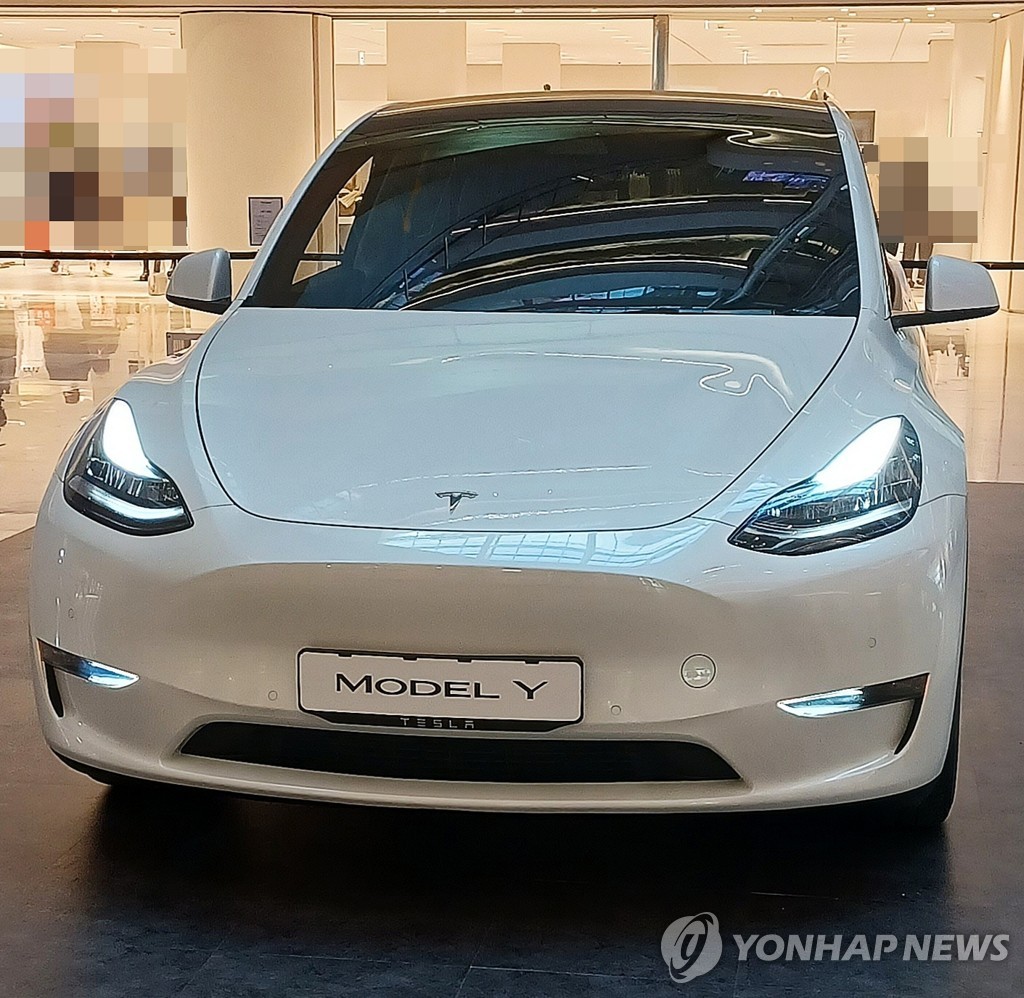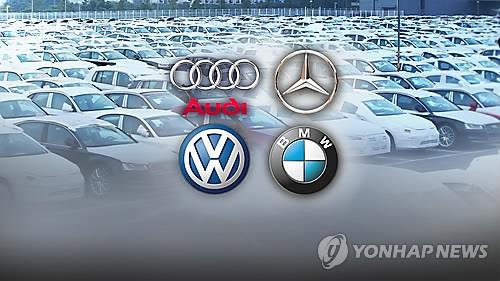(News Focus) Tesla emerges as major player in S. Korea amid strong demand for German cars
By Choi Kyong-ae
SEOUL, Dec. 27 (Yonhap) -- U.S. electric carmaker Tesla Inc. has emerged as a major player in South Korea's imported passenger vehicle market this year, with BMW, Mercedes-Benz and Audi set to close the year as the three best-selling brands, industry data showed Wednesday.
Tesla's vehicle sales have been on the rise since September when it began to bring in Model Y midsized SUVs manufactured at its Shanghai plant at sharply lowered prices compared with the Model Y's U.S.-made versions.
Tesla began to deliver its models, starting with the Model S 90D, to the Korean market in June 2017.
It currently sells the Model S flagship sedan, the Model X flagship SUV and the rear-wheel-drive Model Y SUV in Korea, while operating 1,007 stalls at 147 supercharger stations here.

This photo taken Jan. 27, 2023, shows a Model Y SUV displayed at the Lotte World shopping mall in southeastern Seoul. (Yonhap)
The Shanghai-made Model Y is widely expected to continue to boost Tesla's vehicle sales due to its price competitiveness and the rising demand for emission-free cars.
In the January-November period, Tesla ranked fourth with sales of 15,439 units, exceeding its bigger rivals: Volvo Cars with 15,410 units and Lexus with 12,191 units, according to data from the Korea Automobile Importers & Distributors Association (KAIDA) and local market tracker CarIsYou.
Local demand for German brands remained strong this year as a growing number of consumers prefer high-end and high-performance models.
German carmakers, including the three brands mentioned above and the Volkswagen brand, sold a total of 173,579 units in the 11-month period, accounting for 71 percent of overall imported vehicle sales of 243,811 autos, KAIDA data showed.
BMW topped others by selling 69,546 units, followed by Mercedes-Benz with 68,156 units and Audi with 16,650 units in the first 11 months.
Japanese brands -- Honda Motor Co., Toyota Motor Corp. and its independent brand, Lexus -- saw their sales rebound this year after suffering years of sluggish demand due to a trade dispute between Seoul and Tokyo.
Local consumers shunned Japanese vehicles over the neighbor's restrictions on exports of key materials to South Korea in 2019.
In July 2019, Japan tightened regulations on exports to South Korea of three high-tech materials critical for the production of semiconductors and displays. In the following month, Japan officially removed South Korea from its list of countries given preferential treatment in trade procedures.
The Japanese moves were widely seen as retaliation against court rulings here that ordered Japanese firms to compensate South Korean victims of forced labor during Japan's 1910-45 colonial rule of the Korean Peninsula.
Helped by improving ties between the two countries, however, Japanese brands' vehicle sales jumped 37 percent to 21,027 units in the 11-month period from 15,315 units.
In particular, Lexus vehicle sales soared 87 percent to 12,191 units from 6,534 during the same period due to robust demand for fuel-efficient gasoline hybrid models.
Among luxury brands, Porsche stood out, with its vehicle sales jumping 31 percent to exceed 10,000 units for the first time in the first 11 months.
"A growing number of brands has advanced to the Korean market in recent years, providing local customers more options to choose from at reasonable prices," an industry official said. "Some imported cars are no longer regarded as luxury items."
[email protected]
(END)
-
Yoon declares emergency martial law
-
 (LEAD) Yoon declares emergency martial law, accusing opposition of 'anti-state activities'
(LEAD) Yoon declares emergency martial law, accusing opposition of 'anti-state activities' -
 (URGENT) Yoon declares emergency martial law
(URGENT) Yoon declares emergency martial law -
 (LEAD) Martial law troops enter National Assembly compound
(LEAD) Martial law troops enter National Assembly compound -
 Nat'l Assembly votes to demand lifting of martial law
Nat'l Assembly votes to demand lifting of martial law









